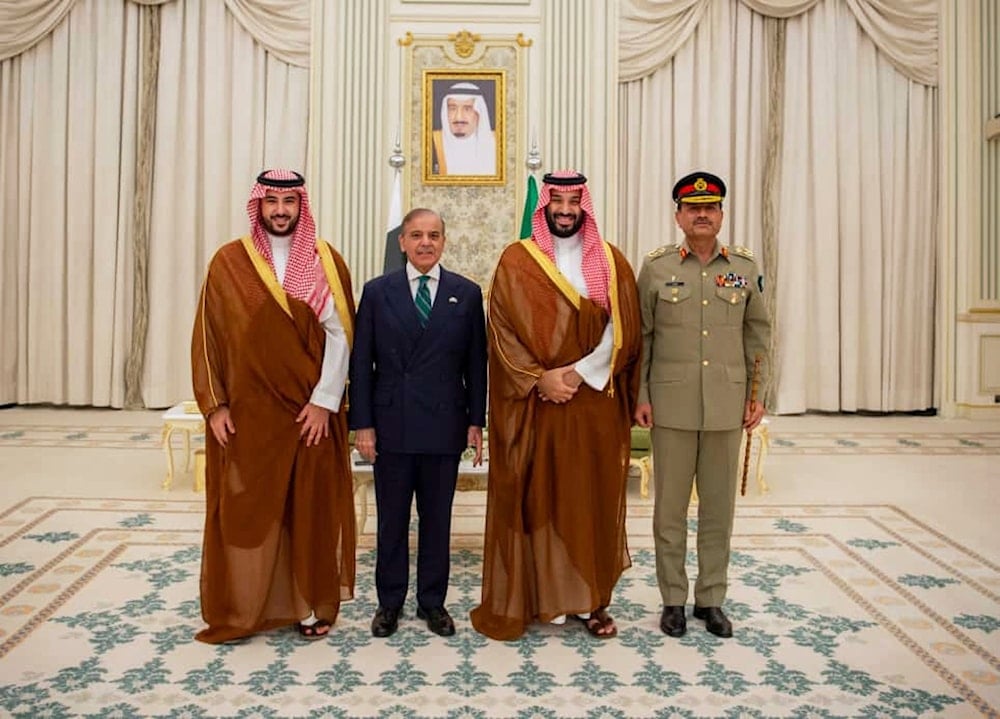Saudi-Pakistan defense pact reshapes Gulf balance rattles India
India faces a diplomatic test after Saudi Arabia and Pakistan signed a defense pact, reshaping Gulf alliances and underscoring China’s expanding regional influence.
-

In this photo released by Pakistan's Press Information Department, Saudi Arabia's Crown Prince Mohammed bin Salman, second right, Saudi Arabia's Defence Minister Khalid bin Salman, left, Pakistan's Prime Minister Shehbaz Sharif, second left, and Pakistan's Army Chief Field Marshal Asim Munir, pose for photographs after signing a mutual defense pact, in Riyadh, Saudi Arabia, September 17, 2025. (Press Information Department via AP)
India’s diplomatic balancing act in the Gulf faces renewed strain following the signing of a landmark defense pact between Saudi Arabia and Pakistan, a move analysts say could reshape regional alignments and expose the limits of New Delhi’s decade-long engagement with the Arab world.
The agreement, signed in Riyadh on September 17, declares that any aggression against either nation “shall be considered aggression against both.” While presented as a gesture of Muslim solidarity amid regional crises, the pact has raised concern in India, which has long sought to cultivate strategic depth with Gulf partners.
According to the South China Morning Post (SCMP), the deal comes against a backdrop of heightened regional tensions, just days after Israeli air strikes on Qatar and months after a deadly India–Pakistan military exchange.
New Delhi’s cautious response
Indian foreign ministry spokesperson Randhir Jaiswal responded cautiously on September 19, emphasizing that India’s strategic partnership with Saudi Arabia “has deepened considerably” and expressing hope that it will continue to “keep in mind mutual interests and sensitivities.”
But experts told SCMP that the pact could indirectly strengthen Pakistan’s defense posture. Sriparna Pathak, a professor of international relations at O.P. Jindal Global University, noted that while the agreement focuses on Middle Eastern security, Saudi financial assistance could “bolster Pakistan’s military capabilities which are singularly aimed at India.”
A setback for India’s Gulf outreach
For Indian Prime Minister Narendra Modi, the pact represents a symbolic setback. Over the past decade, India has invested heavily in building ties with Saudi Arabia and the UAE, balancing its relationships with both "Israel" and the wider Muslim world.
Jean-Loup Samaan, a senior research fellow at the National University of Singapore’s Middle East Institute, told SCMP the agreement marks a “significant setback” for Modi’s Gulf diplomacy, exposing “the limits of India’s ambitions in the region” as Pakistan reasserts its role among key Arab allies.
The development also coincides with growing frustration among Muslim-majority states over "Israel’s" ongoing war on Gaza, which has killed more than 67,000 Palestinians according to Gaza’s Health Ministry. Analysts say the defense pact carries symbolic weight as Riyadh signals alignment with broader Islamic solidarity.
Read more: Pakistan urges creation of 'Islamic NATO' after Doha strike
Shifting power balances
While the agreement is largely diplomatic in scope, analysts cited by SCMP warned that it may alter the region’s perception of India’s neutrality. Rushali Saha, a Delhi-based security risk analyst, said the pact represents a “natural evolution of long-standing ties” between Riyadh and Islamabad but could also embolden Pakistan to use its new standing to “further its agenda on Kashmir.”
The deal also comes amid China’s deepening economic and security engagement with Gulf states — a shift that further complicates India’s regional calculus. As SCMP noted, China’s expanding role with Saudi Arabia and Pakistan highlights the strategic limits of India’s influence in a region increasingly oriented toward multipolar partnerships.
Recalibrating strategy
India is Saudi Arabia’s second-largest trading partner, with bilateral trade exceeding $41 billion last year across energy, space, and counterterrorism sectors. Yet, the latest developments indicate that economic ties alone may not shield New Delhi from the broader political realignments now taking shape.
For India, maintaining its Gulf partnerships while balancing ties with "Israel" will require diplomatic finesse, and a reassessment of its regional strategy as new alignments form around Saudi Arabia, Pakistan, and China.
Read more: India inks $7 billion deal for Tejas fighter jets

 4 Min Read
4 Min Read








